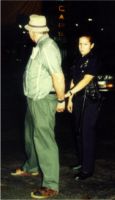 Purveyors of religious hate, including Keith Henson (above, being handcuffed) have demonstrated some of the warning signs that lead to violent crime.
Purveyors of religious hate, including Keith Henson (above, being handcuffed) have demonstrated some of the warning signs that lead to violent crime.Hate crime authorities widely acknowledge the importance of tracing hate campaigns to the individual bigots who incite them, which can enable such a campaign to be shut down at its source.
A number of the nation’s anti-religious extremists were once loosely organized under the umbrella of a hate group known as the Cult Awareness Network (CAN)*, which orchestrated a climate of bigotry in which violence could be fostered against selected religions. While the group known as CAN today promotes religious tolerance under new management, its predecessor targeted members of religious groups, primarily Christian, for “deprogramming” – forced conversions frm faith which can include coercion, kidnapping, assault, battery and even rape.
Among those involved with the former CAN and its survivor sister organization, the so-called “American Family Foundation,” are members of the Skeptics movement, with its avowedly anti-religious ideology. Web sites of Skeptics have contained anti-Christian vernacular not unlike the virulent words on the website of Larry Gene Ashbrook who gunned down churchgoers, mostly teenagers, in a Baptist church in Texas in September 1999.
CAN collapsed in 1996 following a wave of arrests and convictions of deprogrammers and a $4.85 million damage award in a federal civil judgment in Washington State against the group, its executive director and several individuals for a violent deprogramming attempt on a young Christian man. The jury found the defendants’ activity to be “utterly intolerable in a civilized community.”
When the defendants tried to overturn the judgment, Federal Court Judge John Coughenour observed that each seemed to have an “incapability of appreciating the maliciousness of their conduct.”
Among the individuals found liable in the Washington case was Rick Ross, CAN’s highest profile deprogrammer. Ross matches the prototype of a dangerous bigot: described by his psychiatrist as a sociopath, he has run afoul of the law for much of his adult life. His record includes a conviction for grand theft after attempting to embezzle $100,000 in jewelry from a store in Phoenix, Arizona, preceding his career as a deprogrammer-for-hire. As early as 1976, a report by the Arizona Department of Health Services noted that Ross “cannot realize that what he does is socially unacceptable and dangerous… he does not seem to identify himself with society and its laws.”
Ross also had a history of run-ins with the law for deprogramming activity. Regardless, in 1993, he maneuvered himself into the role of an “advisor” to the U.S. Bureau of Alcohol, Tobacco and Firearms (ATF) and FBI prior to and during the lethal 1993 debacle with the Branch Davidian community and its leader, David Koresh, outside Waco, Texas. The mindset of CAN towards the Christian group was expressed in a statement of then CAN President Patricia Ryan in The Houston Chronicle on April 9, 1993, during the standoff which preceded the fiery deaths of nearly 80 men, women and children: “[O]fficials should use whatever means necessary to arrest Koresh, including lethal force.”
The rest is history. Law enforcement recognized the dangers of advice from those involved in the former CAN and began taking stock of the background of potential experts for consultation on matters of religion.
But although that incarnation of CAN soon died as an organization, the bigotry and hatred of its scattered members and kindred groups and allies did not.
